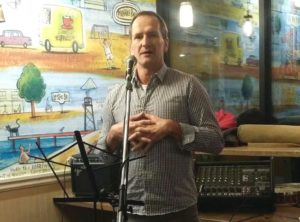We have to start treating water with respect

By Barb Nahwegahbow
TORONTO—“What we want is for people to engage and actually connect with water on a personal spiritual level,”said Mike Nagy, Chair of a non-Indigenous group called the Wellington Water Watchers (WWW) formed in 2007. They call themselves water stewards rather than water protectors.
Nagy was speaking at a fundraising event hosted by WWW at The Shmooz Café in Toronto’s east end on November 17. WWW is a non-profit organization committed to the protection of local water and to educating the public about threats to the watershed. It’s run primarily by volunteer citizens from Guelph-Wellington.
“Toronto is insulated,” said Nagy. “It lives off Lake Ontario and doesn’t really feel the full effects of drought. It’s also obviously an area where there’s a high consumption of packaged water. And where does your water come from if you’re buying packaged water such as Nestlé? It’s not coming from your backyard. It’s coming from a corporate water taker in our area. So we’re in Toronto involving the urban area about what’s really at stake; not just locally, regionally, and provincially, but nationally and internationally with this entire corporate water-taking.”
Nagy prefers to use the term packaged water to bottled water.
We need to understand that water is not an endless resource, said Nagy. It’s this pioneer mentality that was brought over from Europe that Canada has endless trees and cod and water, he said. “They looked at this vast landscape with the European conquerors lens which still exists today, that the resources are there for us to command and take over, but living within the ecosystem isn’t part of it. We know this is not the way First Nations looked at it. We said we’d never run out of water, but that’s a fallacy.”
Nagy lives just outside of Guelph. The city of Guelph with 130,000 people is the largest city in Canada that is solely dependent on groundwater.
“We live in a water-starved area,” said Nagy. “They only lifted the Level 2 water restrictions last week; we’ve been in drought since May. Still, up to 4.7 million litres of water per day are being removed out of the aquifers in our area and put into cases of garbage and sent around the world for a great profit.”
The big corporate water-taker in Wellington County is Nestlé, whose bottled water business is about 10 billion dollars a year, up from 500 million dollars 10 years ago. They extract 20.3 billion litres of Wellington County water per year with two wells, one in Aberfoyle and one in Hillsburgh. They wanted more, so they purchased the Middlebrook well in Elora, outbidding the Township of Centre Wellington who needed that well to accommodate population growth. Nestlé was intending to take another 1.6 million litres of water a day from the Middlebrook well.
The Wellington Water Watchers said, enough is enough.
“This is hoarding of water,” said Nagy. “This is banking water for the future because they know where the profits are.”
Luckily, the permit to take water had expired and vigorous opposition from the WWW led the Ontario Government to issue a two-year moratorium on issuing new permits. The Ontario Ministry of Environment and Climate Change announced its intent to overhaul the permit to take water process, particularly as it pertains to the packaged water sector.
“Nestlé is a bigger Goliath than we’d like to be dealing with,” Nagy said. “We have to mobilize citizens and I think Ontario can draw a line in the sand for the world. We have to get plastic out of our society and we have to start treating water with respect. It isn’t being used for life; it’s being used for profit.”
The evening raised just over $400 for the WWW.
For more information, their website is: www.wellingtonwaterwatchers.ca.


